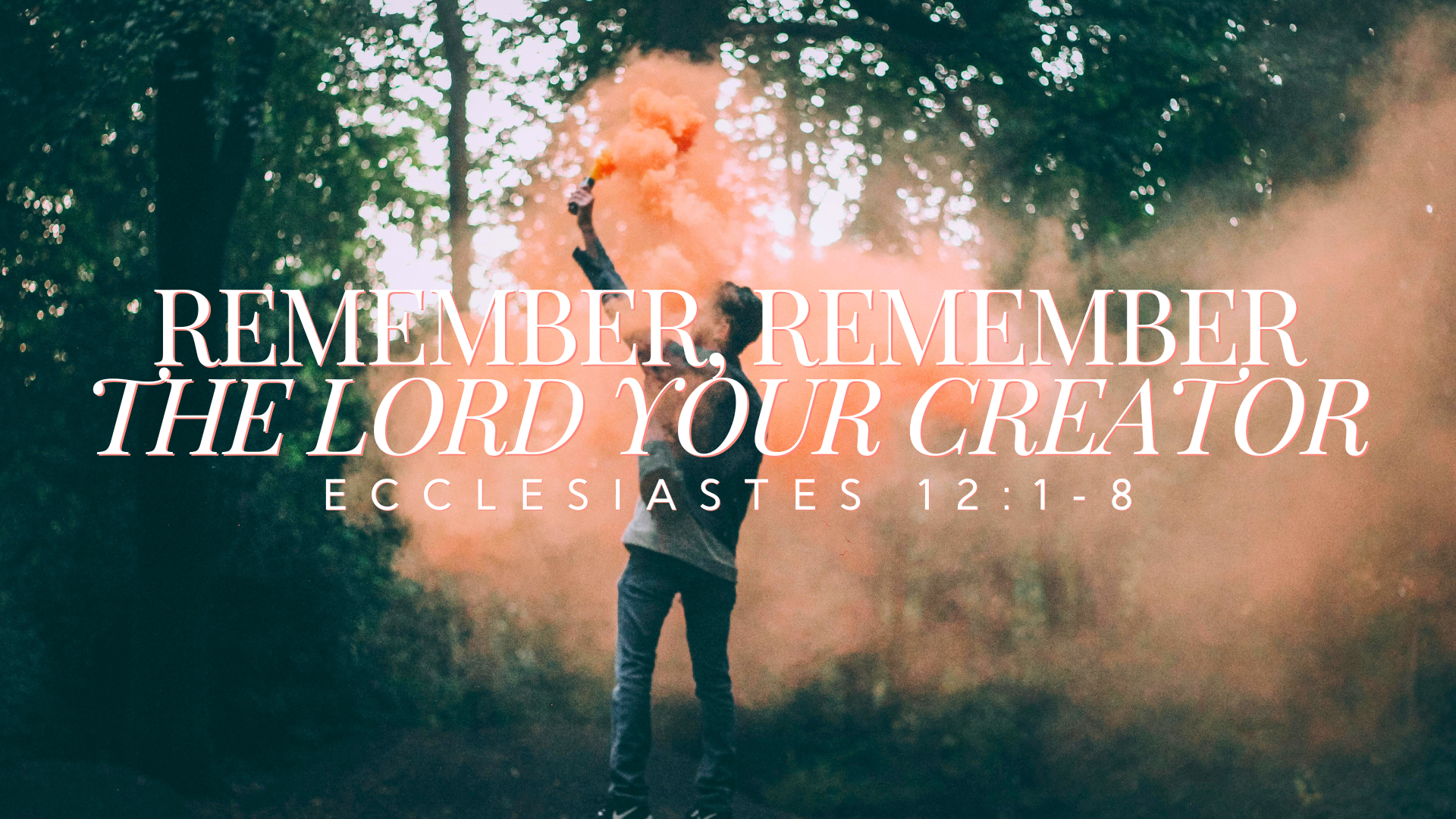
Remember, Remember The Lord Your Creator (Ecclesiastes 12:1-8)
Remember the Maine. Remember the Alamo. Remember, remember, the 5th of November. These famous sayings were each coined as rallying cries – calls to take up a mantle with purpose in our hearts. Active memorials which brought a person into a greater identity and cause.
After all his discoveries, all his experiments, all his trial and error, after charting life to the very edge of the map, the Teacher does not have a secret formula for us. No directions to El Dorado or the fountain of youth. He has no elixir to share to keep us healthy and wealthy. No list of habits which will make us highly effective people.
Instead, in the closing words of his lecture he gives us what seems to be an overly simple mandate: Remember your Creator. That’s it. That’s his answer. There are six more verses after this text, but they are an epilogue, spoken not by the Teacher, but about him. They, too, will have a clincher to wrap up the book, but tonight we hear the Teacher’s bottom line and watch him leave the stage, having set before us life and death, fruitfulness and futility, and challenging us to live life well.
As he ends his long lecture he invites us to consider the end of our own stories. In his closing, he poetically and vividly describes the ravages of age which invariably conclude in physical death.
Ecclesiastes 12:1 – So remember your Creator in the days of your youth: Before the days of adversity come, and the years approach when you will say, “I have no delight in them”;
In the last passage, the Teacher talked about the joys of youth – how we should fully enjoy the prime of life while keeping a Godly and eternal perspective. To savor the days of life’s springtime.
But those days will end for everyone. In their place will be “days of adversity.” Your version may say “difficult days.” But he doesn’t only mean when hard things happen. He’s really got old age in mind.
Three times tonight the Teacher will use the word “before.” Before the joy of life ebbs away, before the fall of creation catches up with our physical bodies, before death comes knocking, we should remember the Lord. This is the way to the kind of life our hearts all long for.
These days we hear a lot about “self-care.” That’s a big priority for some people. The Teacher says before we focus on our own well-being, we should focus on the Wellspring that doesn’t run dry. There is an urgency to this advice. Before. Before. Before. Do it now. This is the life goal to aim at.
Jesus had a similar message to the woman at the well. She wanted a pitcher of water. Jesus said, “If you knew the gift of God, and who is saying to you, ‘Give me a drink,’ you would ask him, and he would give you living water.”[1] And, at the end of their talk we see the woman leave her water jar so she could share the Living Water with her fellow Samaritans.
Ecclesiastes 12:2 – 2 before the sun and the light are darkened, and the moon and the stars, and the clouds return after the rain;
The Teacher has never been as painterly as he is in this poem. He compares the human aging and dying process in striking graphics. A gathering storm. A crumbling house. A body literally falling apart. Some scholars even detect some apocalyptic tones in these scenes.[2]
In his first analogy, we see a gathering gloom. But this isn’t an ordinary storm, it’s a storm on top of a storm – a final winter which no spring will follow. It signals not only the end of a person’s life, but the dissolution of creation itself.
Did you know there are a group of super rich people dedicated to “living forever?” In 2022, more than 120 millionaires and billionaires met in the Alps for the “Longevity Investors Conference.” They enjoyed “rejuvenation dinners.” They discussed getting transfusions of blood from young teenagers and breathing low-oxygen air.[3] They say they are working to “transcend biology.”
They won’t succeed, but let’s say they could. Even so, the hevel world has still got you. Even if you could somehow stave off age and disease and injury, the universe around you is going to end one day. The sun and the moon will go the way of the dinosaur. And death will still claim you.
Ecclesiastes 12:3 – 3 on the day when the guardians of the house tremble, and the strong men stoop, the women who grind grain cease because they are few, and the ones who watch through the windows see dimly,
Most commentators see this list as a poetic description of the body in old age. The hands quiver from feebleness. The legs no longer have the strength to hold you upright. The word for ‘women’ here (your version may say ‘maids’ or ‘grinders’) is the Hebrew word for molars.[4] They can’t chew like they used to. Partially because a bunch have fallen out! “They are few.”
The muscles weaken and other systems start to fail, too. The eyes don’t see so well anymore. Kelly’s grandmother is in her mid-90s and was just diagnosed with glaucoma. Thanks to the marvel of modern medicine, there’s some treatment, but age is going to claim her vision. We tell ourselves “that’s part of life.” In reality, it’s part of death. And the Teacher always wants us to consider death.
Ecclesiastes 12:4 – 4 the doors at the street are shut while the sound of the mill fades; when one rises at the sound of a bird, and all the daughters of song grow faint.
As we age, typically we become less and less active. The regular occupations of life are no longer pursued. Production comes to a halt. And yet, many older individuals sleep less than ever. They’re up before the rooster crows and, even when they do manage to get some shuteye, the slightest disturbance startles them awake. That’s the image here.
There is a malicious hevel-ness to that, isn’t there? A cruel irony. The person in this scene is awake more than the youth, but has less to do and less strength to do it. They must face their frailty for even more hours of the day. But they’re unable to occupy themselves with passive enjoyments like listening to music, because their hearing has also deteriorated.
Ecclesiastes 12:5 – 5 Also, they are afraid of heights and dangers on the road; the almond tree blossoms, the grasshopper loses its spring, and the caper berry has no effect; for the mere mortal is headed to his eternal home, and mourners will walk around in the street;
The effects of age aren’t only physical. We see here there is an emotion and mental impact as well. Fear has a greater place than it does in youth. I don’t see too many senior citizens jumping off the roof of their house into their swimming pool.
The almond blossoms here refer to hair gone white.[5] The caper berry refers to the loss of appetites and desires.[6]
The grasshopper image can be taken one of two ways: The first is one we’ve all seen – a grasshopper on a cold winter’s day, unable to move, certainly unable to spring or hop. But the Hebrew can also be rendered as if the grasshopper has landed on an aging person, and it feels like an immense weight to them, too heavy to lift.[7]
As the Teacher sketches the scene, at this point in a person’s life, there’s really only one more accomplishment ahead: Death. We see a funeral procession and the mourners laying the person in the grave.
It’s interesting: When the Teacher talks about the mourners walking around, he uses the same verb he did back in the beginning of the book where he talked about the turning of the cycles of the natural world and his own turning in his desperate attempt to find a life worth living.[8]
Despite his wealth, his power, his genius, his ability, he could not outrun death. No one can. That is the end of the human story under the sun, and the cycle begins again for the next generation.
But then the Teacher brings to mind what comes next. Each one of us is on our way to an eternal home.
It’s such a remarkable contrast: Here’s the crumbling, dying, human body and yet within it houses an eternal spirit. And that, really, has been the major theme of this entire research project the Teacher has undertaken: I want to live a life worth living, I want to feel lasting fulfillment, I want eternal satisfaction, but no matter what I do, I see that I cannot escape time, death, and chance. So, what am I going to do about death?
The unbeliever spends so much time on his mortal body at the expense of his immortal soul.
As I’ve said a few times in these studies: You are going to die. You will leave this world and be ushered to your eternal home. There are only two addresses in eternity, heaven or hell. Which place will be your residence? That’s a question you must deal with in this life.
Ecclesiastes 12:6 – 6 before the silver cord is snapped, and the gold bowl is broken, and the jar is shattered at the spring, and the wheel is broken into the well;
Some commentators believe the cord and bowl refer to a golden lamp, suspended by a chain. When the chain is cut, the bowl smashes on the ground and the light goes out.
Then there are two images at a well. One, the earthen jar, which is broken and therefore all the water is spilled. The wheel would be a pulley installed above a deep well, on which the bucket would be lowered.[9] But the wheel breaks and the well is useless.
We recognize how hard it is to craft a silver chain, a golden bowl, a water-tight container, the capable pulley. But in a moment, they’re all broken beyond repair.
On top of that, we sense the great value of a human life.[10] It’s a treasure like gold or silver.
Ecclesiastes 12:7 – 7 and the dust returns to the earth as it once was, and the spirit returns to God who gave it.
Ecclesiastes often refers to the first few chapters of Genesis. This is another call back. From dust we came and to dust our bodies will return. But our spirits? Those do not go to the earth because they belong to the Lord. He is the One Who breathed life into us. As Roland Murphy writes, “God is the Owner and Donor of life.”[11] Your life is on loan from Him.
When you die, your spirit will be immediately in the presence of God. You will either be judged for your sin or you will be rewarded for your service. Either way you will live forever. The judged live forever in the Lake of Fire, commonly known as Hell. The rewarded live forever with God in Heaven.
How do you get into the heaven group? Very simple: Believe on the Lord Jesus and you will not perish. If you confess with your mouth, “Jesus is Lord,” and believe in your heart that God raised him from the dead, you will be saved.[12]
God gave you the life you’re living right now. He wants to give you everlasting life. But as sinners, we deserve death. He has given us a way out of our guilt – a way out from under the tyranny of life, death, and chance in this hevel world. Accept the Indescribable Gift of God, the Savior, Who took the judgment for you, so you could live forever in heaven.
But you must do it now. Before the cord is snapped. Before the bowl breaks. Before it’s too late. It is appointed for man once to die and after this comes judgment.
Ecclesiastes 12:8 – 8 “Absolute futility,” says the Teacher. “Everything is futile.”
Hevel. We’re back where we started. This is exactly what the Teacher said in chapter 1, verse 2. In this life, in this world, in this reality under the sun, everything is hevel. It’s a wisp of smoke passing away. Your beauty is fading. Your memory is fading. Your vitality is fading. Your ability is fading. Your opportunities are fading. That is the way things are because sin dominates the world.
So, is the Teacher just ending here in defeatism and pessimism and frustration? Not at all. Let’s end at the beginning of this chapter. Look at the first part of verse 1 again.
Ecclesiastes 12:1a – So remember your Creator in the days of your youth.
That is the answer. That is the bottom line. That is the conclusion for how to lay hold of a life worth living, full of lasting satisfaction.
Who are we supposed to remember? The Teacher did something new here. He uses the term Creator. Everywhere else in the book he only called God, God.[13] But here he acknowledges Him as Creator. And linguists point out he uses a plural term.[14] It’s another connection to the beginning of Genesis, where God said, “Let us make man in our image.”[15]
The Teacher is telling us not to simply acknowledge a higher power or to live as base Deists. No, he insists that we must find the source of life in the God of Genesis. The God of the Bible. The God of revelation. The God Who breathed life into you when He created you.
And the fact that He created you begs the question: What are you created for? Can you answer that question? God made you for a reason and a purpose. Not as an afterthought. Not as a background element to fill in the frame. Your life was given to you on purpose with purpose.
You were created for life. The Hebrew word is hay. Hay, not hevel. Fruitfulness, not futility. The Old Testament idea of life, Bible dictionaries will tell us, means to not just have biological vitality, but to experience that which God wants to give us. A sustained life. A truly prosperous life. To be quickened and revived in the power of God.[16] One form of the word describes flowing water. In fact, Jesus used a wordplay on that meaning when He spoke to the woman at the well. That’s life. In fact, Jesus said in John 6 that you may think you’re alive, but you only truly have life if you’re in a relationship with the God of the Bible through Jesus Christ. He said if you’re not willing to be in relationship with Him, then you do not have life within yourself. Because life is only really life if it’s everlasting life.
In contrast to Mesopotamian ideas, which taught that man was created to be mortal, the Bible comes along and says, “Oh, no, no. You were created for immortality.”[17] And the New Testament doubles down when Jesus said He came that we might have life more abundantly.[18] But the world wants to convince us that life is only found and experienced in the tangible experiences offered in the here and now. But take Solomon at his word: We won’t find life there.
Instead, the Teacher says, “If you want to lay hold of life remember the Lord.” That word remember is packed full. The Theological Wordbook of the Old Testament explains it doesn’t only mean to recall. It means to meditate upon, to pay attention to, to commemorate, and to take appropriate action. It means to have internal understandings that are accompanied by external acts.[19]
Remember your Creator. Because He remembers you. “God remembered Rachel.”[20] “God remembered Noah.”[21] “God remembered Abraham.”[22] He remembered Israel.[23] He remembered Hannah.[24] He remembers us in our humiliation, because His love endures forever.[25]
Remember that He gave you life for a purpose and has invited you to discover those purposes. But, be advised: The time is short. And you’ve got a world of futility trying to stop you from receiving the gift of life God has offered you.
Before you’re debilitated, devastated, or dead, remember your Creator and what you were Created for. And remember the difference between the life your Creator offers and the so-called life the world under the sun offers.
In the life God offers us, He provides strength in our weakness. Peace in our troubled hearts. Rest when we’re weary. Support when we’re broken. A future defined by glory, not gloom. Remember, remember the Lord your Creator.
| ↑1 | John 4:10 |
|---|---|
| ↑2 | Duane Garrett The New American Commentary, Volume 14: Proverbs, Ecclesiastes, Song Of Songs |
| ↑3 | https://www.technologyreview.com/2022/11/16/1063300/billion-dollar-mega-rich-live-forever/ |
| ↑4 | Robert Alter The Hebrew Bible: A Translation With Commentary |
| ↑5 | Victor Matthews, Mark Chavalas, John Walton The IVP Bible Background Commentary: Old Testament |
| ↑6 | James Smith The Wisdom Literature And Psalms |
| ↑7 | Garrett |
| ↑8 | Alter |
| ↑9 | Keener |
| ↑10 | Smith |
| ↑11 | Roland Murphy Word Biblical Commentary, Volume 23A: Ecclesiastes |
| ↑12 | Romans 10:9 |
| ↑13 | Douglas Miller Ecclesiastes |
| ↑14 | Smith |
| ↑15 | Genesis 1:26 |
| ↑16 | Theological Wordbook Of The Old Testament |
| ↑17 | ibid. |
| ↑18 | John 10:10 |
| ↑19 | TWOT |
| ↑20 | Genesis 30:22 |
| ↑21 | Genesis 8:1 |
| ↑22 | Genesis 19:29 |
| ↑23 | Psalm 98:3 |
| ↑24 | 1 Samuel 1:19 |
| ↑25 | Psalm 136:23 |








